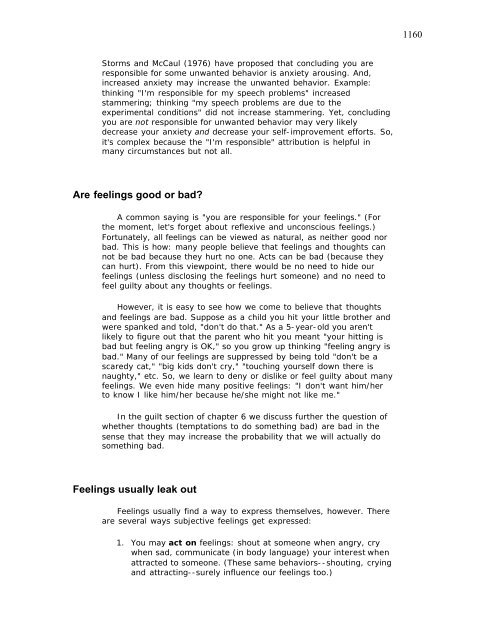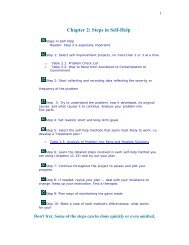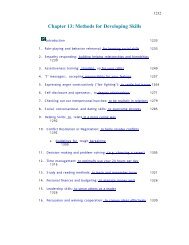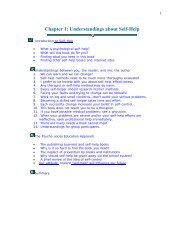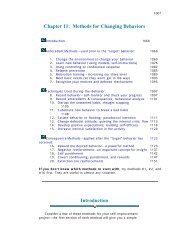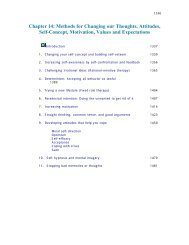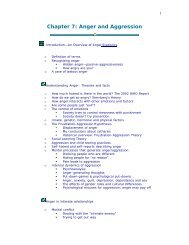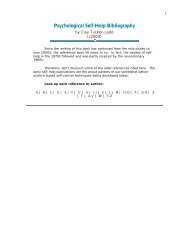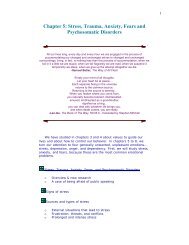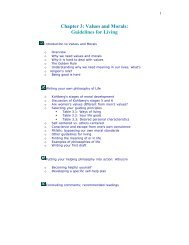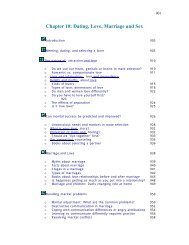Chapter 12: Methods for Changing Emotions - Psychological Self-Help
Chapter 12: Methods for Changing Emotions - Psychological Self-Help
Chapter 12: Methods for Changing Emotions - Psychological Self-Help
Create successful ePaper yourself
Turn your PDF publications into a flip-book with our unique Google optimized e-Paper software.
1160<br />
Storms and McCaul (1976) have proposed that concluding you are<br />
responsible <strong>for</strong> some unwanted behavior is anxiety arousing. And,<br />
increased anxiety may increase the unwanted behavior. Example:<br />
thinking "I'm responsible <strong>for</strong> my speech problems" increased<br />
stammering; thinking "my speech problems are due to the<br />
experimental conditions" did not increase stammering. Yet, concluding<br />
you are not responsible <strong>for</strong> unwanted behavior may very likely<br />
decrease your anxiety and decrease your self-improvement ef<strong>for</strong>ts. So,<br />
it's complex because the "I'm responsible" attribution is helpful in<br />
many circumstances but not all.<br />
Are feelings good or bad?<br />
A common saying is "you are responsible <strong>for</strong> your feelings." (For<br />
the moment, let's <strong>for</strong>get about reflexive and unconscious feelings.)<br />
Fortunately, all feelings can be viewed as natural, as neither good nor<br />
bad. This is how: many people believe that feelings and thoughts can<br />
not be bad because they hurt no one. Acts can be bad (because they<br />
can hurt). From this viewpoint, there would be no need to hide our<br />
feelings (unless disclosing the feelings hurt someone) and no need to<br />
feel guilty about any thoughts or feelings.<br />
However, it is easy to see how we come to believe that thoughts<br />
and feelings are bad. Suppose as a child you hit your little brother and<br />
were spanked and told, "don't do that." As a 5-year-old you aren't<br />
likely to figure out that the parent who hit you meant "your hitting is<br />
bad but feeling angry is OK," so you grow up thinking "feeling angry is<br />
bad." Many of our feelings are suppressed by being told "don't be a<br />
scaredy cat," "big kids don't cry," "touching yourself down there is<br />
naughty," etc. So, we learn to deny or dislike or feel guilty about many<br />
feelings. We even hide many positive feelings: "I don't want him/her<br />
to know I like him/her because he/she might not like me."<br />
In the guilt section of chapter 6 we discuss further the question of<br />
whether thoughts (temptations to do something bad) are bad in the<br />
sense that they may increase the probability that we will actually do<br />
something bad.<br />
Feelings usually leak out<br />
Feelings usually find a way to express themselves, however. There<br />
are several ways subjective feelings get expressed:<br />
1. You may act on feelings: shout at someone when angry, cry<br />
when sad, communicate (in body language) your interest when<br />
attracted to someone. (These same behaviors--shouting, crying<br />
and attracting--surely influence our feelings too.)


